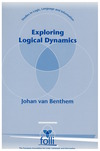This book is an exploration of current trends in logical theories of information flow across various fields, such as belief revision in computer science or dynamic semantics in linguistics. It provides one mathematical perspectives encompassing all of these. This framework generates a new agenda of questions concerning dynamic inference and dynamic operators. The result is a mathematical theory of process models, simulations between these, and modal languages over them, which is developed in quite some detail. New results include theorems on expressive completedness, representation of styles of inference, and new kinds of decidable remodeling for standard logics. This theory is also confronted with practice in computer science, linguistics and philosophy.
Johan van Benthem is professor in the department of mathematics and computer science at the University of Amsterdam and professor, Bonsall visiting chair, in the department of philosophy at Stanford University.
- Introduction
Part I The Dynamic Turn
- 1 Cognitive Actions
- 1.1 Recognizing Cognitive Processes
- 1.2 Mathematical Process Models
- 1.3 Standard Logics Dynamified
- 1.4 Propositions as Procedures
- 1.5 Notes
- 2 Dynamification
- 2.1 Updating Information in Propositional Logic
- 2.2 Changing Perspectives in Predicate Logic
- 2.3 Dynamic Modal Logic
- 2.4 Changing Preferences
- 2.5 General Conclusions
- 2.6 Notes
- 3 Technical Tools
- 3.1 First-Order Predicate Logic
- 3.2 Modal Logic
- 3.3 Relational Algebra
- 3.4 Dynamic Logic
- 3.5 Notes
Part II Logical Foundations
- 4 Process Simulation and Definability
- 4.1 Transition Sytems and Process Equivalences
- 4.2 Languages over Transition Systems
- 4.3 Bisimulation Invariance and Modal Definability
- 4.4 Modal Fine-Structure of First-Order Logic
- 4.5 Notes
- 4.6 Questions
- 5 Relational Algebra of Process Operations
- 5.1 Spaces of Logical Operations
- 5.2 Boolean Structure
- 5.3 Safety fir Bisimulation
- 5.4 Notes
- 5.5 Questions
- 6 Two-Level Static-Dynamic Architecture
- 6.1 Abstract Dynamic Logic
- 6.2 Dynamic Modal Logic
- 6.3 Notes
- 6.4 Questions
- 7 Dynamic Styles of Inference
- 7.1 Styles and Structural Rules
- 7.2 Representation Theorems
- 7.3 A Modal Perspective
- 7.4 Inverse Logic
- 7.5 Switching Between Styles
- 7.6 Notes
- 7.7 Questions
- 8 Decidable Remodelling: Arrow Logic
- 8.1 Core Content Versus Formal Wrappings
- 8.2 Arrow Logic in a Nutshell
- 8.3 Dynamic Arrow Logic
- 8.4 Dynamic Logic with Arrows
- 8.5 Notes
- 8.6 Question
- 9 Modal Foundations for Predicate Logic
- 9.1 The Modal Core of Tarski Semantics
- 9.2 Dependency Modals
- 9.3 What Do First-Order Axioms Say?
- 9.4 Quantifiers and Substitutions
- 9.5 Landscape of Deductive Strength
- 9.6 Rethinking the Language
- 9.7 Applications and Repercussions
- 9.8 Representation
- 9.9 Decidability
- 9.10 Translations
- 9.11 Notes
- 9.12 Questions
Part III Implications
- 10 Computational Process Theories
- 10.1 Definition of Process Equivalences
- 10.2 Axiomatization
- 10.3 Infinitary Theory of Transition Systems
- 10.4 Special Transition Systems
- 10.5 Process Algebra
- 10.6 Safety for Process Constructions
- 10.7 Appendix I: Modal Logic of Constructions
- 10.8 Appendix II: Concurrent Dynamic Logic
- 10.9 Notes
- 10.10 Questions
- 11 Imperative Aspects of Logic Programs
- 11.1 Declarative Versus Procedural?
- 11.2 Dynamics of Deductive Approximation
- 11.3 Proof Theory of Procedures
- 11.4 Calculus of Tasks
- 11.5 Notes
- 11.6 Questions
- 12 Understanding Natural Language
- 12.1 Syntax
- 12.2 Semantics
- 12.3 Pragmatics
- 12.4 Alternatives Frameworks
- 12.5 Notes
- 12.6 Questions
- 13 Philosophical Repercussions
- 13.1 Meaning and Cognition as Activities
- 13.2 Three Models for Cognitive Dynamics
- 13.3 Cognitive Fine-Structure
- 13.4 Contents and Wrappings
- 13.5 Managing Diversity
- 13.6 Notes
- Bibliography
- Index
8/1/96


